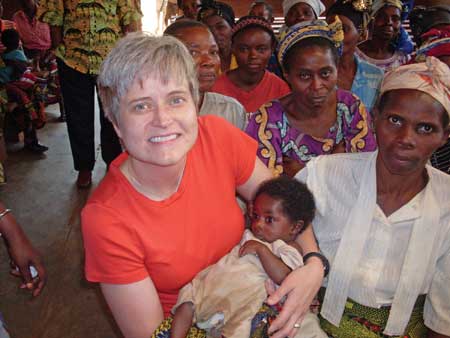By Kelly Brooks-Staub

How can one person give the gift of hope, economic empowerment, and improved health to a woman who has suffered and survived warfare, rape, and displacement from her home, family, and community? The answer, according to Associate Professor Nancy E. Glass, PhD, MPH ’96, RN ’94, may be as simple as purchasing a pig.
In 1990-1991, Glass was a young Peace Corps volunteer, serving in the country of Zaire. Now, after nearly 20 years—including a decade of bloody civil war—she is finding new ways to help families in the Democratic Republic of the Congo (formerly Zaire) who suffer from malnutrition, disease, and a severely damaged economic and social infrastructure.
For rural women serving as head of their households, says Glass, the challenges posed by the country’s gender roles and norms make health and economic stability seem near impossible to secure. In 2008, she helped launch Pigs for Peace through the nonprofit organization, Great Lakes Restoration, in an effort to help such women.
“In other countries, microfinance has done wonders for improving the lives of poor, rural women,” notes Glass. “Empowering women economically leads to increased gender equity in the society, and that means improved health for women and their children.”
In the Congo, where annual income averages $89 per year, potential borrowers may be daunted by traditional microfinance lending models, so lenders are turning to livestock rather than cash to provide economic opportunities. But why pigs in particular?
 “Pigs are common farm animals in the Congo,” says Glass. “They don’t need much space to live and forage, and they’ll eat just about anything. This, combined with the social prohibition against women making decisions about selling or killing a cow or goat, makes pigs the right solution for this kind of lending program.”
“Pigs are common farm animals in the Congo,” says Glass. “They don’t need much space to live and forage, and they’ll eat just about anything. This, combined with the social prohibition against women making decisions about selling or killing a cow or goat, makes pigs the right solution for this kind of lending program.”
Here’s how it works: Make a $50 donation, and Pigs for Peace will loan a pig to a Congolese family and provide a pen, veterinary support, mating opportunities, and education about pig farming. Rather than repaying principal and interest monetarily, the family gives two piglets back to the organization—one from each of the first two litters. Other piglets can be kept as meat or sold for an average price of $40 per animal.
“At first, Pigs for Peace sounds like simply economic outreach, but it’s so much more,” says Glass. “We provide education and support to the families regarding health, rape prevention, and gender equity. The women use the money from the pigs to plant new crops, raise chickens, access clean water, purchase mosquito nets, start businesses, and send their children to school. I really believe a pig can save a family.”
To learn more about Pigs for Peace, or to make a donation, visit www.glrbtp.org, become a fan of the Pigs for Peace Facebook page, or contact Dr. Glass at 410-614-2849 or [email protected].